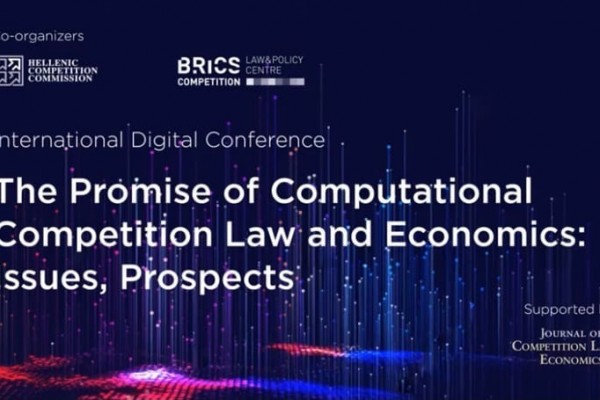The BRICS Competition Law and Policy Centre and the Hellenic Competition Commission co-organised an international online Conference on “The Promise of Computational Competition Law and Economics”, supported by the Journal of Competition Law and Economics.
Gathering legal and economic experts, as well as members of Competition Authorities, the aim of this event was to discuss policy and legal issues arising from the increasing use of computational tools in competition law enforcement and to examine the prospects of applying Artificial Intelligence techniques in this field, in the future.
Competition Authorities around the world are encountered with issues arising from an ever more complex economy and increasingly rely on the use of computational techniques (Big Data, Artificial Intelligence, machine/ deep learning) in enforcing competition law. The Conference addressed the challenges encountered by competition authorities in integrating such techniques and advanced learning in the legal framework of competition law enforcement, examining in particular the legal requirements with regard to the standard of proof, procedural rights and investigation procedures. Based on computational techniques, software screening tools for investigating collusive conduct have been applied by several Competition Authorities.
Ioannis Lianos, President of the Hellenic Competition Commission, stressed the importance of the conference:
"The Hellenic Competition Commission and BRICS Competition Law and Policy Centre have co-organized this conference to discuss a highly important issue for competition law and competition authorities throughout the world determined by the rapid technological development of recent years – the use of computational techniques and computational economics in competition law enforcement, as well as challenges faced by competition authorities in integrating such techniques and advanced learning in the legal framework of competition law enforcement".
Alexey Ivanov, Director of BRICS Competition Law and Policy Centre, pointed out that:
"We need to pay more attention to the digitalization of the activities of the power structures themselves. It is advisable to determine approaches to the regulation of digital platforms and digital ecosystems, to develop a policy for further actions within the framework of digital transformation. A number of authorities in Russia, including the antimonopoly authority, are already using digital tools that are aimed at preventing illegal actions in the markets. We can draw attention to the successful experience of introducing digital technologies in the activities of the antimonopoly authorities of Brazil, India, and China".
The conference was also attended by Thibault Schrepel, Assistant Professor, Utrecht University School of Law, Faculty affiliate at Stanford CodeX Center; Giuseppe Colangelo, Jean Monnet Chair, University of Basilicata, Fellow at the Transatlantic Technology Law Forum, Stanford University Law School; Yann Guthmann, Head of the Digital Economic Unit, French Competition Authority; Elena Rovenskaya, the IIASA Advancing Systems Analysis (ASA) Program Director; Pierre Regibeau, Chief Economist, European Commission; David Dorrell, Director of Data science, Competition and markets Authority; Bence Toth, PhD candidate, University College London; Tatiana Lima, Analyst, Department of Economic Studies, Competition Authority of Brazil; Evgeny Litovchenko, Deputy Director, the Information Center of the FAS Russia; Vassilis Vassalos, Data Science Expert, Hellenic Competition Commission.

